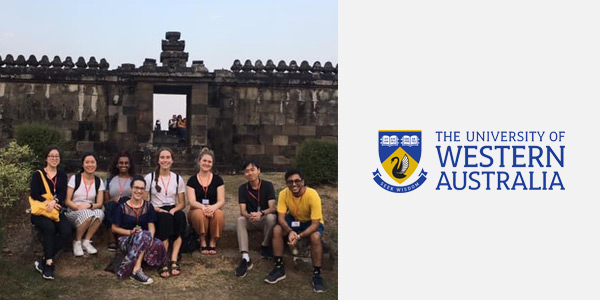Joshua Khoo is a New Colombo Plan Mobility Grant recipient from the University of Western Australia. Joshua undertook the Public Health Study Tour in July 2019.
Q: Why did you decide to undertake ACICIS’ Public Health Study Tour?
It sounded like a good experience, and I was interested in public health and its potential as a future career option. In addition, part of public health is related to infectious disease and epidemiology which I also had an interest in. I also wanted to meet people with different backgrounds, go to a different country and push myself out of my comfort zone (as I partook in this program without knowing anybody else).
Q: Did you receive a New Colombo Plan Mobility Grant? If so, how did this contribute to your experience in Indonesia?
I was lucky enough to receive it. This had an immensely positive contribution. Without the New Colombo Plan Mobility Grant I most likely would not have undertaken this study tour. The grant allowed me to both partake in the program and be able to spend a bit more money on other items in Indonesia that allowed me to have a greater experience there than I would have had otherwise.
Q: What did you find to be the most challenging about your experience on the PHST?
The first few days, just meeting everyone and getting accustomed to the new environment. It was daunting at first to have to meet so many new people and also to not know anyone else on the tour prior to going.
Q: What public health issues in Indonesia have you become more interested in/aware of as a result of this tour?
The infectious disease section, particularly on malaria and dengue had me interested, especially in the innovative way they combated the disease (through the addition of a bacteria called Wolbachia).
Q: Which was your favourite field trip?
It would be a tie between the Kali Code river and the World Mosquito Program. Kali Code due to it being a great introductory field trip in Indonesia. It allowed us to see parts of Indonesia we wouldn’t normally see, and observe how changes in building infrastructure can actually improve public health. With the World Mosquito Program, I was impressed by the ingenuity of the solution they had to the mosquito problem, and the dedication the staff had in combating dengue and malaria in such a large area.
Q: How do you think the Public Health Study Tour will influence your future career or studies?
It has made me think that in the future a career in public health, especially in the field of epidemiology and infectious disease, might be an option. This had interested me before, but after this tour I have become more interested in it.
Q: What did you most enjoy about the seminar series?
The talk on communicable diseases was interesting for me. I was intrigued by the amount of diseases both relatively common (eg. malaria and dengue) and tropical diseases which Indonesia had to combat and the decisions and policies put in place to deal with these disease.
Q: What was your favourite aspect about visiting Indonesia?
The people. Everyone who I met, especially the ACICIS staff (Citra, Yani, Lala and particularly Asty) all made the tour very comfortable and enjoying. All the staff (inclusive of the photographers, Boby and Zul) were friendly and often included us in conversation and made us feel accepted. The student buddies we had were incredibly nice, and we even watched movies and had dinner with them, which was a bonus.


